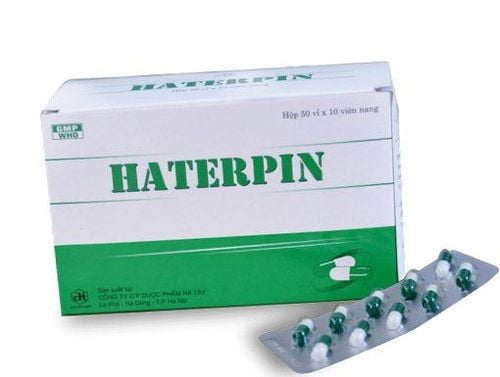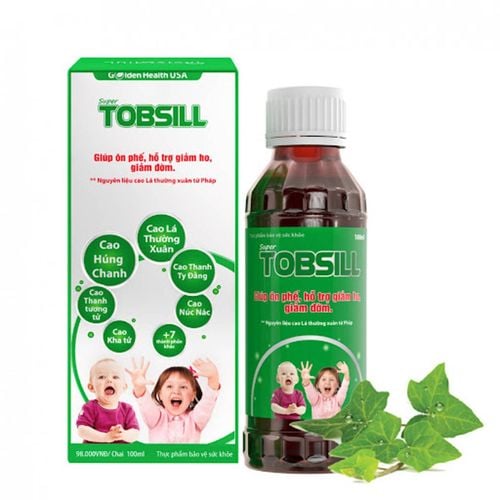This is an automatically translated article.
Eucatopdein cough medicine has ingredients including Eucalyptol, Codein and Guaifenesin. This product is recommended for use in adults and children over 12 years of age for the purpose of relieving cough. However, the use of Eucatopdein requires some important guidelines and precautions.
1. Uses of the drug Eucatopdein
Before going to learn about the effects of Eucatopdein, let's answer the question what is Eucatopdein?
Eucatopdein drug belongs to the group of preparations acting on the respiratory tract, the composition includes Eucalyptol, Codeine and Guaifenesin with the respective concentrations of 15.5 and 20mg.
Eucatopdein cough medicine is prepared in the form of soft capsules, packed in a box of 10 blisters x 10 tablets. Eucatopdein products are manufactured by Ha Tay Pharmaceutical Joint Stock Company (Vietnam) and circulated in our country with registration number VD-5722-08.
Eucatopdein products are used in patients over 12 years of age for the symptomatic treatment of dry cough or respiratory irritation.
2. Instructions for using the drug Eucatopdein
Eucatopdein cough medicine in soft capsule form should only be used orally with the following dosage:
Adults and children over 6 years old: 1 Eucatopdein capsule x 3 times/day; The duration of use of Eucatopdein should not exceed 7 days.
3. Contraindications of the drug Eucatopdein
Eucatopdein cough medicine should not be used in the following patients:
People with hypersensitivity or allergy to codeine, Glyceryl Guaiacolat and any components of Eucatopdein; Children under 18 years of age who have had tonsillectomy and/or curettage of V.A; Patients with impaired liver function, cirrhosis; People who are in a state of respiratory failure; Mothers who feed their children with milk; Patients carrying genes metabolizing drugs via CYP2D6 super fast; Eucatopdein coughs for children under 12 years of age who are at high risk for serious, even life-threatening adverse reactions.
4. Drug interactions of cough medicine Eucatopdein
Eucatopdein when used in combination can increase the effectiveness of the following active ingredients/drugs:
Active opiate agonists, anesthetics; Painkillers, sedatives, sleeping pills; Tricyclic antidepressants; Monoamine oxidase inhibitors; Products containing alcohol; Other CNS depressants. The analgesic effect of Codeine is increased when Eucatopdein is combined with Aspirin and Paracetamol, but it is reduced or lost when used with Quinidine.
The codeine component in the drug Eucatopdein may reduce the metabolism of Cyclosporin when used in combination due to its ability to inhibit cytochrome P450 enzymes.
5. Eucatopdein side effects
Common unwanted symptoms when using Eucatopdein :
Nervous disorders such as headache, dizziness, thirst and some other strange sensations; Digestive dysfunction such as nausea, vomiting or constipation; Urinary disorders such as urinary retention or oliguria (oliguria); Cardiovascular disturbances such as tachycardia or bradycardia, palpitations, fatigue, orthostatic hypotension. Besides, Eucatopdein can also cause some side effects with little or rare frequency such as:
Manifestations of drug allergies such as itchy skin, urticaria; Respiratory depression, sedation, euphoria or restlessness; Abnormalities of digestive function such as stomach pain or biliary tract spasm; Anaphylactic reaction ; Appears hallucinations, disorientation; Visual disturbances; Convulsions; Circulatory failure ; flushing, sweating, intense fatigue; Addiction due to long-term use of Codeine with a dose of 240 - 540mg/day. Some common symptoms of drug shortages are restlessness, tremors, muscle twitching, sweating, and runny nose. In addition, the drug Eucatopdein can cause psychological dependence, physiological and drug addiction. Patients treated with Eucatopdein should promptly notify their doctor of any unwanted side effects.
6. Some Precautions When Taking Eucatopdein
Eucatopdein cough medicine should be used with caution in patients with prostate enlargement, adrenal or thyroid dysfunction; Caution when combining Eucatopdein with Phenothiazines, Barbiturates, Benzodiazepines, MAO inhibitors or active tricyclic antidepressants; Codeine in Eucatopdein should be used only at the lowest effective dose and for the shortest time; Codeine is not recommended for children with breathing problems, such as difficulty breathing or wheezing while sleeping...;
7. Some notes when using Eucatopdein
The maximum duration of taking Eucatopdein should not exceed 7 days.
Notes regarding metabolism via CYP2D6:
Codeine in Eucatopdein is metabolised to Morphine (active metabolite) via CYP2D6 enzyme in the liver. Therefore, patients with partial or complete deficiency of this enzyme may not achieve the desired therapeutic effect with Eucatopdein. It is estimated that up to 7% of the Caucasian population has a deficiency of this enzyme; In contrast, CYP2D6 over- or super-rapid metabolizers carrying eucatopdein have an increased risk of adverse reactions due to opioid toxicity even at commonly recommended doses. This is due to the faster conversion of Codeine to Morphine, resulting in higher than expected serum concentrations of morphine; Common symptoms of opioid (Morphin) intoxication include confusion, drowsiness, shallow breathing, pupillary constriction, nausea, vomiting, constipation, and loss of appetite. Severe poisoning can present with circulatory, respiratory and life-threatening symptoms (although very rarely fatal); The estimated prevalence of superfast CYP2D6 drug carriers in different races is summarized as follows: African/Ethiopian: 29%; African Americans: 3.4% to 6.5%; Asians: 1.2% to 2%; Caucasians: 3.6% to 6.5%; Greeks: 6%; Hungarians: 1.9%; Nordic: 1 to 2% Precautions when using Eucatopdein for patients with impaired respiratory function:
Codeine component in Eucatopdein is not recommended for use in children with impaired respiratory function, including including neuromuscular disorders, severe cardiac or respiratory disease, upper respiratory tract infections and pneumonia, multiple or moderate trauma through major surgery; The above factors can worsen the symptoms of morphine poisoning. Codeine in Eucatopdein can cause drowsiness, so patients taking this medicine should not drive or operate machinery.
Eucatopdein is not recommended for pregnant women;
Eucatopdein is not recommended for women who are breastfeeding. At usual therapeutic doses, Codeine and its active metabolite Morphine can be present in breast milk in very low concentrations and is unlikely to adversely affect the nursing infant. However, if the patient is a carrier of the gene that metabolises the drug via superfast CYP2D6, morphine may be present in breast milk in higher concentrations and, in very rare cases, may lead to symptoms of opioid toxicity in infants, which can be fatal.
Please dial HOTLINE for more information or register for an appointment HERE. Download MyVinmec app to make appointments faster and to manage your bookings easily.













